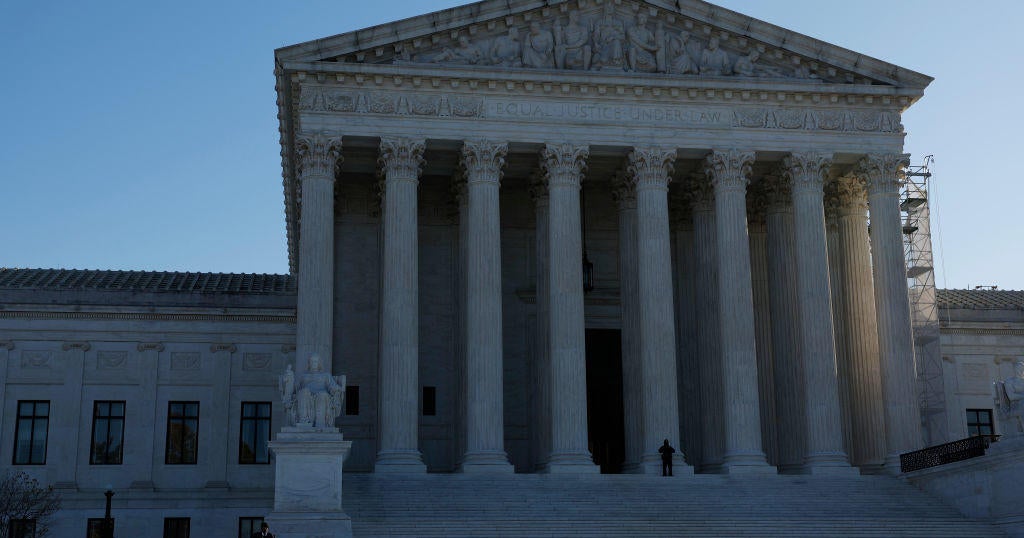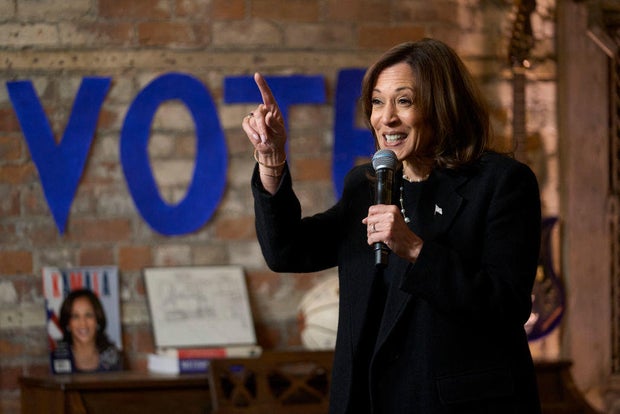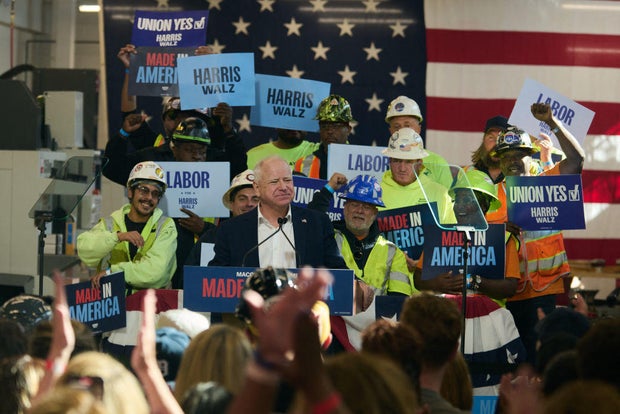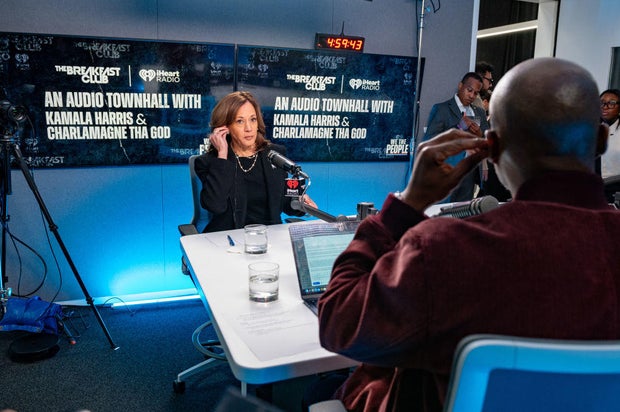CBS News
In Michigan, Harris campaign sees path to victory going through the suburbs

Vice President Kamala Harris‘ campaign sees her path to victory in Michigan going through the suburban vote, a historically Republican voting bloc that has shifted left in recent elections, and one the campaign is confident it can flip.
In a memo first obtained by CBS News, the Harris-Walz campaign said it can win the Midwestern state’s 15 Electoral College votes by capitalizing on former President Donald Trump’s “unprecedented weakness” among women and White, college-educated voters.
President Biden narrowly beat Trump by two points among suburban voters nationwide in 2020, CBS News’ exit poll showed. But Trump had a slight edge in the Michigan suburbs, according to a CNN exit poll of the state.
The Harris campaign argues that suburban voters have drifted away from Trump since then, and said the primary reason is the Supreme Court’s 2022 decision overturning the national right to an abortion and returning the issue to the states.
“A real strength”
GEOFF ROBINS/AFP via Getty Images
Chris Wyant, a senior Harris campaign adviser in Michigan, said the Jan. 6 attack on the U.S. Capitol, the conservative Project 2025 policy blueprint and Harris’ economic proposals have also shifted suburban voters toward the vice president.
“What’s emerged as such an opportunity is the suburban voters that we’ve seen, who are very reliable regular voters, who have really run away from Donald Trump in the last four years,” he said.
“That is a real strength for this campaign that I have not seen in the past,” added Wyant, a veteran of Barack Obama and Hillary Clinton’s campaigns.
Harris will campaign in the suburbs of Grand Rapids and Detroit on Friday, her seventh trip to the state as a candidate. Wyant said campaign officials “feel great” about the amount of time she’s in the state, and expect to frequently see her and Minnesota Gov. Tim Walz, her running mate, in the closing days of the race.
Walz campaigned in Macomb County north of Detroit last Friday, where Trump won by eight points. The Republican nominee has also placed a premium on the state, making at least six trips there since Harris became a candidate. Both Harris and Trump will be campaigning in the Detroit area on Friday.
DOMINIC GWINN/Middle East Images/AFP via Getty Images
A New York Times/Siena poll in September found that Harris led Trump by five points among suburban voters in Michigan. Among women voters, Trump lagged behind Harris by 22 points. And a September CBS News poll showed Harris up nine points with women voters in the state, and leading by seven points with White college-educated voters.
“The reason women rights have been taken away from them is because of Donald Trump,” said Michigan Sen. Gary Peters. “And that’s why women, in particular across suburban areas, vote overwhelmingly for Kamala Harris.”
Some Michigan Republicans are skeptical of Democrats’ confidence, particularly when it comes to the impact of abortion on the race.
In 2022, Michigan voters passed Proposal 3, which created a right to abortion in the state’s constitutiondue to a big push by Michigan Governor Gretchen Whitmer, who cruised to re-election. It passed with 55.8% of the vote.
Michigan State Rep. Bryan Posthumus, a Republican who represents a GOP-leaning district north of Grand Rapids, argued that Prop 3’s passage means abortion rights are not as salient of an issue for suburban voters as Democratic campaigns might think.
“It worked for them in 2022. But the reality is abortion was settled in 2022, so it’s not an issue,” he said.
Black voters remain crucial
High turnout among Black voters in cities like Detroit and Flint are also crucial to Harris’ strategy in Michigan. In recent days, Harris has doubled down on mobilizing these voters through a new set of policies geared toward Black men, as well as a publicity blitz that has included an interview with influential radio host Charlamagne tha God.
Aaron J. Thornton/Getty Images for iHeartMedia
Her campaign expects to “meet 2020 levels of support” with Black voters, and cites high return rates of mail-in ballots among Black voters in Detroit’s Wayne County as the reason why. The campaign’s ground game has seven of their 52 offices in the state’s most populous county, and has partnered with local influencers and groups to specifically reach younger, harder-to-reach Black voters.
Nearly 800,000 absentee ballots have been returned statewide as of Thursday, according to Michigan’s secretary of state.
An October CBS News poll of the battleground states showed Harris’ support among Black voters mirroring Mr. Biden’s support in 2020 exit polls, though a slightly higher number of Black men are backing Trump compared to Black women.
“The real concern is what are we going to do to make sure everybody feels included,” said Detroit Rev. Charles Williams II, who is worried about “what the polling is suggesting around Black men.”
Wyant pointed to more than 20 events focused on Black engagement so far in October as a sign of the campaign’s approach, and said they have been working on reaching Black voters for months.
“We recognize there are some voters that may be late deciders on this. That’s why we’re intensely engaging and making sure that we, as a campaign here and nationally, are finding ways to meet people where they’re at,” he said.
The Trump campaign’s outlook in Michigan
The Harris campaign maintains a numerical advantage over Trump on the ground game with staffers (375) and volunteers (more than 42,000 since Harris became the nominee). The Democratic nominee has more than 50 offices in the state, with several in the rural counties in the western and central part of the state, as the campaign tries to cut into Trump’s margins.
A Trump campaign spokesperson said they have dozens of campaign offices spread out across the state, with more than 100 paid staff and 6,000 local precinct captains.
The Trump campaign sees inflation and immigration as key issues in the suburbs, and have focused their outreach program on “low-propensity: voters — those who may only turn out during presidential election years or are otherwise disengaged with politics.
“While Kamala Harris continues to lie to American voters about her record and refuses to answer for it, Team Trump is doubling down on our efforts to reach voters where they are,” said Victoria LaCivita, the Trump campaign’s communications director for Michigan.
Rank-and-file union voters are also a group where the Trump campaign feels confident they can peel off Democratic support, citing local polling by the Teamsters suggesting a disconnect between members and leadership. Trump has also repeatedly used rhetoric against electric vehicle policies, in an attempt to appeal to auto-industry workers.
“If I don’t win, you will have no auto industry within two to three years. China is going to take over all of your business because of the electric car,” Trump said at a September rally in Flint, MI.
“I will never tell you what kind of car you have to drive,” Harris rebutted at her own rally in Flint in October.
While the national Teamsters board declined to endorse a candidate, the head of the Michigan Teamsters, Kevin Moore, has backed Harris. Shawn Fain, the president of the United Auto Workers, has also been a frequent surrogate for the Harris campaign.
The impact of Arab-American and Muslim voters
One variable that could impact the coalition Harris is looking to build is the Arab-American and Muslim community, particularly Lebanese and Palestinian voters who have been vocal against the Biden-Harris administration for not doing more to stop deadly Israeli military strikes in Gaza and Lebanon.
Michigan towns with heavy Arab-American and Muslim populations, such as Dearborn and Hamtramck, are in the suburbs of Detroit.
In February, more than 101,000 Democratic voters chose “uncommitted” in the state’s primary, largely in protest of the White House’s response to the war in Gaza. Mr. Biden won Michigan in the 2020 general election by 154,188 votes.
The “uncommitted” movement declined to endorse Harris in September, but also told supporters to not vote for a third-party candidate, citing concerns that doing so would help Trump win.
“People have a right to be hurt. They have a right to be angry, what’s going on in Gaza and now catching fire all around the Middle East is intolerable,” said Mikail Stewart-Saadiq, a Detroit imam who has publicly backed Harris.
Harris met with members of the “uncommitted” group after an August rally in Detroit, and met with other Arab-American and Muslim leaders in the area after an October rally in Flint, MI.
Last week, the Harris campaign also deployed Keith Ellison, the first Muslim to be elected to Congress and the former attorney general of Minnesota, to Michigan. They also tout the support of three councilmen from Hamtramck, though the mayor of the majority-Muslim town is supporting Trump.
“We had to have some important leaders that are supporting us publicly and then also find ways to engage in the community more directly and in private manners,” Wyant said.
Ed O’Keefe and
contributed to this report.
CBS News
What to know about the charges in UnitedHealthcare CEO’s killing

Watch CBS News
Be the first to know
Get browser notifications for breaking news, live events, and exclusive reporting.
CBS News
Prominent pro-Putin ballet star Sergei Polunin says he’s leaving Russia

Moscow — Former Royal Ballet star Sergei Polunin, famous for his tattoos of Russian President Vladimir Putin, on Wednesday announced that he plans to leave Russia. The Ukrainian-Russian dancer was one of the most prominent stars who backed Russia’s unilateral 2014 annexation of Crimea and its military assault on Ukraine. He was rewarded with prestigious state posts.
In a rambling, misspelled message on his Instagram account, Polunin wrote: “My time in Russia ran out a long time ago, it seems at this moment that I have fulfilled my mission here.”
The post first appeared Sunday on his little-read Telegram account.
Ian Gavan/Getty
Polunin, 35, did not give a specific reason for leaving but said that “a time comes when the soul feels it is not where it should be.”
He said he was leaving with his family — his wife Yelena and three children — but “where we will go is not clear so far.”
In the summer, the dancer complained of a lack of security and said he was being followed.
Polunin, who was born in Ukraine, backed Putin’s 2014 annexation of Crimea — a prelude to the ongoing, full-scale invasion of Ukraine that Putin launched in February 2022.
The dancer was granted Russian citizenship in 2019. He was appointed acting head of a dance academy in occupied Crimea’s biggest city, Sevastopol, and director of the city’s opera and ballet theatre, for which a large new building is under construction.
Just last year he was decorated by Putin for his role in popularizing dance. But in August he was replaced as head of the dance academy by former Bolshoi prima Maria Alexandrova, and a week ago, Russia’s arts minister Olga Lyubimova announced his theater director job would go to singer Ildar Abdrazakov.
This came after on December 9 Polunin published a social media post saying he was “very sorry for people” living in the heavily bombarded village near Ukraine’s city of Kherson, where his family originates from, and that “the worst deal would be better than war.”
Ian Gavan/Getty
Aged 13, Polunin won a scholarship to train at the Royal Ballet School in London and became its youngest ever principal dancer.
With his tattoos — including a large depiction of Putin’s face emblazoned prominently on his chest — and his rebellious attitude, he became known as the “bad boy of ballet” and caused a sensation by resigning from the Royal Ballet at the height of his fame in 2012.
Later he made a 2015 hit video to Irish musician Hozier’s song “Take Me to Church” and was the star of a 2016 documentary called “Dancer.”
He moved to perform at Moscow’s Stanislavsky Musical Theatre’s ballet before launching a solo career, starring in dance performances in roles including the mystic Grigory Rasputin.
In 2019 he posed for AFP with a large tattoo of Putin on his chest which he later supplemented with two Putin faces on either shoulder. He also has a large Ukrainian trident on his right hand.
This year he took part in Putin’s campaign for reelection as a celebrity backer.
CBS News
Supreme Court takes up South Carolina’s effort to defund Planned Parenthood

Washington — The Supreme Court on Wednesday agreed to consider South Carolina health department’s effort to cut off funding from Planned Parenthood because it performs abortions, wading into another dispute over access to the procedure in the wake of its reversal of Roe v. Wade.
The case, known as Kerr v. Edwards, stems from the state’s decision in 2018 to end Planned Parenthood South Atlantic’s participation in its Medicaid program. Gov. Henry McMaster, a Republican, directed the South Carolina Department of Health and Human Services to deem abortion clinics unqualified to provide family planning services and end their Medicaid agreements.
Planned Parenthood operates two facilities in the state, one in Charleston and the other in Columbia, and provides hundreds of Medicaid patients with services like physicals, cancer and other health screenings, pregnancy testing and contraception. Federal law prohibits Medicaid from paying for abortions except in cases of rape or incest, or to save the life of the mother.
Planned Parenthood and one of its patients, Julie Edwards, sued the state, arguing that cutting off its funding violated a provision of the Medicaid Act that gives beneficiaries the right to choose their provider.
A federal district court blocked South Carolina from ending Planned Parenthood’s participation in its Medicaid program, and a U.S. appeals court upheld that decision, finding that Edwards could sue the state to enforce the Medicaid Act’s free-choice-of-provider requirement.
The legal battle has already been before the Supreme Court in the past, with the high court last year ordering additional proceedings after deciding in a separate case that nursing home residents could sue their state-owned health care facility over alleged violations of civil rights.
After reconsidering its earlier decision, the three-judge appeals court panel ruled unanimously in March that Edwards’ lawsuit against the state could go forward and said South Carolina couldn’t strip Planned Parenthood of state Medicaid funds.
“This case is, and always has been, about whether Congress conferred an individually enforceable right for Medicaid beneficiaries to freely choose their healthcare provider. Preserving access to Planned Parenthood and other providers means preserving an affordable choice and quality care for an untold number of mothers and infants in South Carolina,” Judge Harvie Wilkinson wrote for the 4th Circuit panel.
South Carolina officials asked the Supreme Court to review that decision, marking the third time the case has been before the justices. The justices agreed to take up the question of whether “the Medicaid Act’s any-qualified provider provision unambiguously confers a private right upon a Medicaid beneficiary to choose a specific provider.”
South Carolina is among the more than two dozen that have passed laws restricting access to abortion in the wake of the Supreme Court’s June 2022 decision reversing Roe v. Wade. In South Carolina, abortion is outlawed after six weeks of pregnancy with some exceptions.
Several states have also enacted laws blocking Planned Parenthood from receiving Medicaid funding, including Arkansas, Missouri, Mississippi and Texas.







